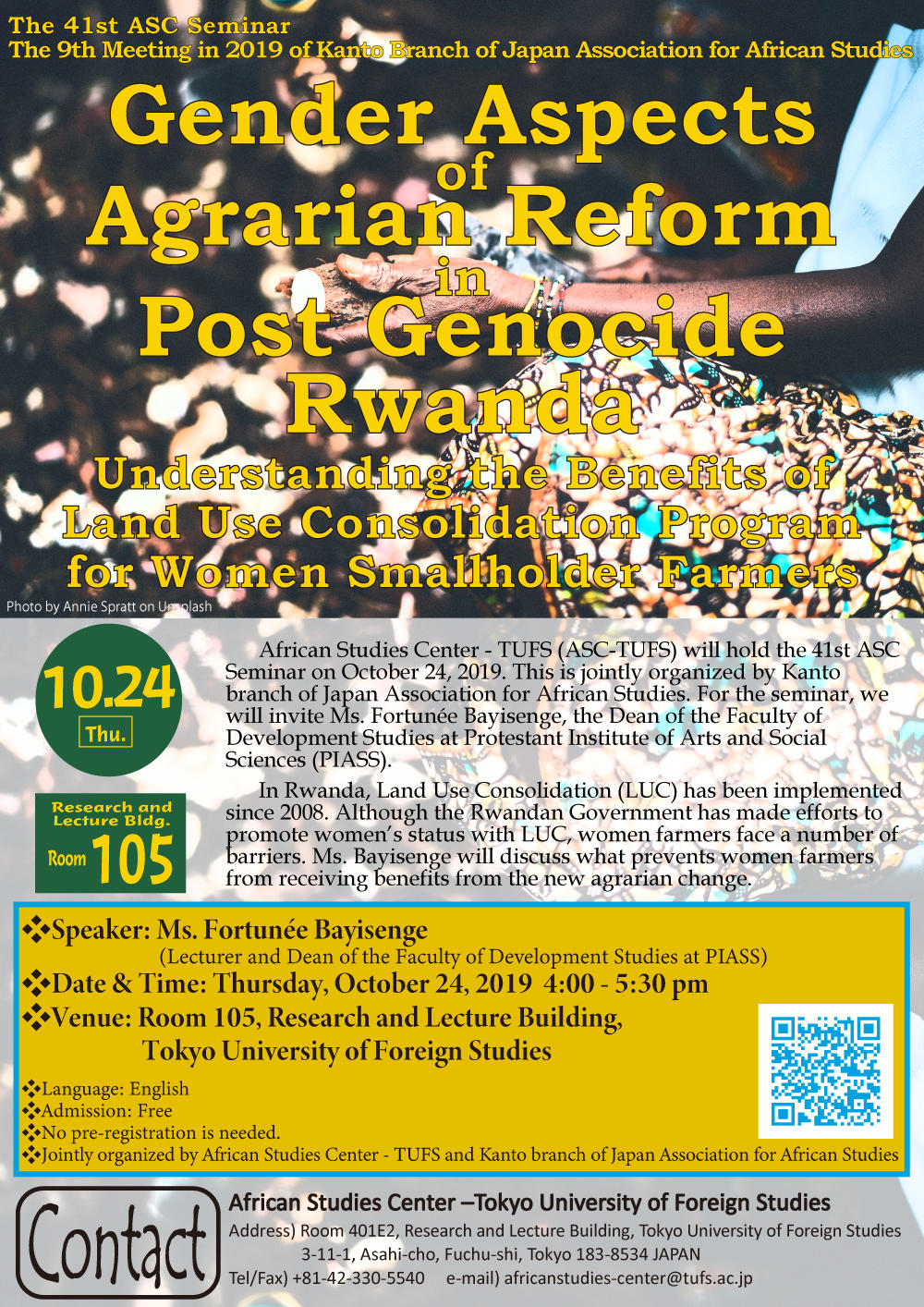African Studies Center - TUFS (ASC-TUFS) will hold the 41st ASC Seminar on October 24, 2019. This is jointly organized by Kanto branch of Japan Association for African Studies. For the seminar, we will invite Ms. Fortunée Bayisenge, the Dean of the Faculty of Development Studies at Protestant Institute of Arts and Social Sciences (PIASS).
In Rwanda, Land Use Consolidation (LUC) has been implemented since 2008. Although the Rwandan Government has made efforts to promote women's status with LUC, women farmers face a number of barriers. Ms. Bayisenge will discuss what prevents women farmers from receiving benefits from the new agrarian change.
◆Title: Gender Aspects of Agrarian Reform in Post Genocide Rwanda: Understanding the Benefits of Land Use Consolidation Program for Women Smallholder Farmers
◆Speaker: Ms. Fortunée Bayisenge (Lecturer and Dean of the Faculty of Development Studies at PIASS)
◆Abstract: Over the last decade, agriculture intensification was highlighted as a strategy for boosting agriculture productivity and poverty reduction in sub-Saharan Africa. One of the issues which has been recommended for the success of this agrarian change is the empowerment of women as they constitute the majority of those involved in subsistence agriculture. Rwandan Government implemented Land Use Consolidation (LUC) since 2008 as the key pillar of Crop Intensification program (CIP). Despite consistent efforts by the Rwandan Government in promoting women's status and achieving gender equality across all sectors, women farmers are still facing constrains which limit their productive capability. As they are practicing subsistence agriculture, they have low access to agricultural inputs such as modern seeds and fertilisers, agriculture market and finance, access and control over land and related property, and high level of illiteracy. Since the implementation of LUC, official assessments affirmed its contribution to agricultural productivity whereby yields of selected crops such as maize, beans, wheat, cassava, Irish potatoes and soybeans have gone up more than three times between 2008 and 2012.The aim of this research is to investigate the benefits of LUC for women smallholder farmers in Rwanda. The study used focus group discussions and semi structured interviews to collect data from women smallholders, agricultural officials, and women representatives in District Councils of Gisagara and Nyaruguru District in the Southern Province. Research findings revealed that, though women small farmers have accessed agricultural inputs under LUC and managed to increase the production of the selected crops, they still face a number of barriers which hinder their benefits from the new agrarian change. Those include namely limited opportunities to access trainings in modern farming techniques and agriculture finance, especially for those involved in growing food crops. Being a top down and state driven program, women smallholders encountered limited autonomy in decision making under LUC regarding the selection of crops to grow and the market for selling their production. In addition, gender dynamics within farmer's households constrain women's benefits from this agrarian change. In short, the findings illustrates how the intersection of gender dynamics and the class of women farmers is overlooked by the program, and yet pulls down the benefits of women small farmers from the new Rwandan agrarian change.
◆Keyword: gender, land use consolidation, agriculture modernization, women empowerment
◆Date & Time: Thursday, October 24, 2019 4:00 - 5:30 pm
◆Venue: Room 105, Research and Lecture Building, Tokyo University of Foreign Studies
◆Language: English
◆Admission: Free
◆No pre-registration is needed.
◆Jointly organized by African Studies Center - TUFS and Kanto branch of Japan Association for African Studies


